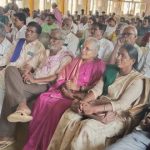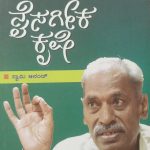“THE ELUSIVE PEACOCK – DEVANURU MAHADEVA AND DALIT IMAGINATION” -BY DR.PRITHVI DATTA CHANDRA SHOBHI
[Written version of a special lecture delivered by Dr.Prithvidatta Chandrashobhi, Professor of Mysore University, at The Manipal Center for Philosophy and Humanities on 19.2.2013 on the writings of Devanur Mahadeva. ದೇವನೂರ ಮಹಾದೇವ ಮತ್ತವರ ಬರಹ ಕುರಿತು ಮೈಸೂರು ವಿಶ್ವವಿದ್ಯಾಲಯದ ಅಧ್ಯಾಪಕರಾದ ಡಾ.ಪೃಥ್ವಿದತ್ತ ಚಂದ್ರಶೋಭಿಯವರು The Manipal Centre for Philosophy and Humanities ನಲ್ಲಿ 19.2.2013 ನೀಡಿದ ವಿಶೇಷ ಉಪನ್ಯಾಸದ ಬರಹ ರೂಪ. ಕೃಪೆ – barefootphilosphers.wordpress.com]
Abstract: First I intend to discuss Mahadeva’s politics and show how he often deliberately circumvents the ideological divide that separate Dalit movement from its adversaries. As a result, Mahadeva’s relationship with the Dalit movement (with Dalit Sangharsh Samiti or DSS) has been fraught and paradoxical, even though he remains committed to Dalit activism. He was one of the founding members of the DSS, its President / Convener multiple times and generally looked upon as a visionary figure who could offer new vistas for Dalit politics; yet he has also been its chief dissident. My intention in the first part of the talk is to outline three inter-related aspects: the nature of Mahadeva’s commitment to his writing; that he is explicitly political unlike the modernist Navya writers but his politics isn’t rigidly defined by ideological commitments to political positions staked out by the Ambedkarite Dalit movement; finally, his refashioning of politics through aesthetics. In the second part of my talk, I will illustrate these arguments through an analysis of his stories and novellas. Specially, I will discuss how Mahadeva re-imagines realism, which constitutes a departure in Kannada literary imagination. He deliberately chooses the Dalit language of Chamarajanagar region for narrative purposes. This choice in particular of using a regional dialect not only for dialogue but for more significant narrative purposes is a major departure. If Mahadeva’s departures make him elusive to his readers, admirers and critics, he also remains indispensable for any serious discussion of caste and social transformation. “One of the things I am interested in is the role that literature plays in bringing about social transformation. It is from this growing interest in Kannada fiction that I present my thoughts on Devanuru Mahadevan. I choose to speak on Mahadeva because of his recent work on caste, but also because of this quality of Mahadeva’s work which brings together issues of justice and ethics in a remarkable ways.”
On Mahadeva’s elusiveness: “Both as a writer and social activist, Mahadeva is largely misunderstood. Though his friends and readers have tried to seek him out, the writer himself has remained elusive. He would often refuse to meet his closely friends, his disciples. So one of the most prominent writers in Kannada right now, Al Rashid, (who is in many ways Mahadeva’s successor in Kannada literature) writes an imaginary conversation with Mahadeva as they walk around the lake in Mysore. This quality of elusiveness has been a quality of Mahadeva through his literary career. Yet he is not a recluse. He is highly political. He’s been one of the few non-controversial figures who could bring all the Dalit factions together. He is not a very impressive speaker, unlike his fellow activists, he often speaks in riddles and makes his point through short stories, his longest speech was probably 7 to 8 minutes. But he is deeply committed to social progressive causes. He differs from other social Dalit activists, in that he is seen as more humane, trying to transcend his position in Dalit movement. This is true for his writing as well.” “He has been offered tickets to various political parties, nominations, awards, etc, but he has always stayed away from such inducements. Because of the acclaim he received early in his career, and the opportunities that opened up for him when he was young, the expectation on the part of his admirers and on the part of his followers and friends seems superhuman. They want him to be the leader of a social movement which would bring together all these oppressed groups, and they want him to head a political movement, and when he refuses, they become disappointed and critical.”
On Kusuma Bale: “His own experience becomes the subject matter for his writings. In Kusuma Bale, Mahadeva tries to reinvent realism. He refuses to tell a linear story. It isn’t easy to summarise the plot of this book. […] In effect, the basis of criticism was that the text wasn’t easy to read. Even university professors joked that Kusuma Bale needs to be translated to Kannada first before anyone can read it. “But there they missed the radical thing that Mahadeva was trying to do by experimenting with language. Mahadeva tries to write in a literary register we do not recognize in conventional Kannada literature. He tries to tell a story true to the storytelling tradition of the Chamrajanagar region. The realism of his narrative prose comes from the storytelling strategies of that region. Writers have used ordinary language for dialogue from the Sanskrit playwrights onward But what Mahadeva does is use the language of the Chamrajanagar region for the description as well. That makes things difficult for the reader, it reads like poetry. What Mahadeva does is turn ordinary speaking language into literary language. “One of the things we noticed is that he takes the standard Kannada sentence structure and plays with that. He tries to play with the rhythm of folk epics, but within the sentence structure of Kannada. If any of you have tried to translate Kannada, you will realize the biggest problem is the absence of a subject. The use of passive voice heightens the literary quality of a work. This enables the Kannada writer to play with multiple meanings in each sentence. Mahadeva heightens this by using the repetition of certain verbs to enhance the effect of a certain action, without identifying the subject. “Mahadeva democratizes language. This goes back to what I was saying about him equating ‘human’ to ‘being’ or ‘jeeva’. He has a way of not privileging any of his characters, not even his heroes. They hardly get any page space. He plays around with storytelling itself. Kusuma Bale becomes difficult for anyone to build a politics on, simply because it is hard to reduce it to a paragraph. What he creates is a different aesthetic experience. If mainstream Dalits engaged with realism and straightforward storytelling and documentation in an aesthetic manner, Mahadeva complicates that creative project by re-imagining realism itself. ”
On Mahadeva’s politics: “What do I mean by refashioning politics through aesthetics? They are a way of reaching out to, or connecting with, what he thinks is new political possibilities that are emerging. This is politics on a larger scale. How do we organise our social relations? His politics forays are different. They are animated by the same ideals, but in his approach he is almost a Gandhian. He advocates constructive programmes, similar to those of Gandhi. I am talking about his politics on these two levels – an electoral politics, and politics reached through a creative enterprise.”







